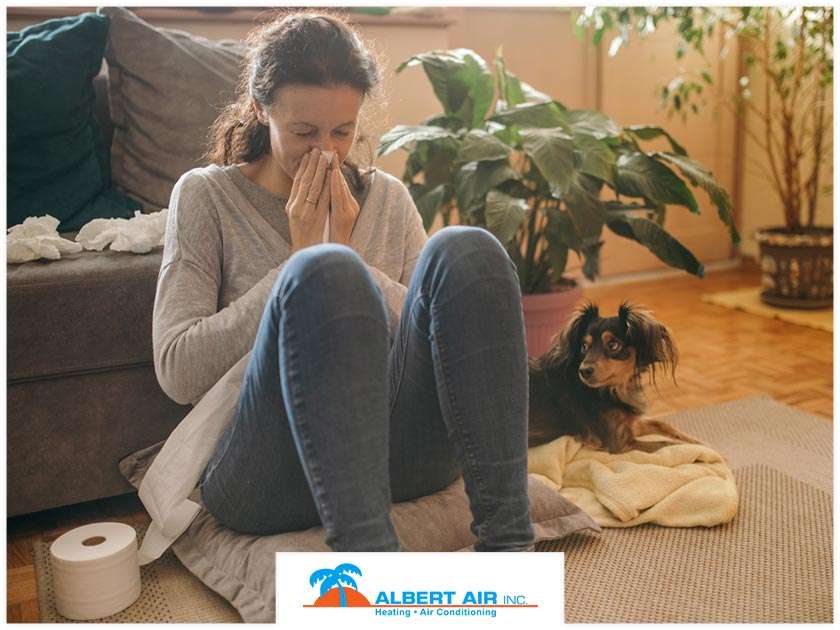Control Indoor Allergens To Improve Indoor Air Quality
Allergy and asthma control begins at home. Many people with allergies stay indoors when pollen and mold is high. But dust mites, pet dander and even cockroaches can cause problems indoors.1
The Environmental Protection Agency recommends three ways you can improve indoor air quality2:
- Control your contact with indoor airborne allergens
- Ventilate your indoor areas well
- Use air cleaners to clean indoor air
Eight out of 10 people in the United States are exposed to dust mites. Six out of 10 are exposed to cat or dog dander. Cockroaches cause allergic reactions in people who live in the inner cities or southern parts of the United States. 3
Better air quality in your home, office, school and car can reduce allergy and asthma triggers.
What You Can Do To Prevent Winter Allergies
A big problem with winter allergies is that cold-weather lifestyles can turn a simple allergic reaction into something worse, says Dr. Jones.
“People are turning up their heaters, which makes the indoor air even drier,” he says, “and that leads to dry noses, which increases the incidence of nosebleeds and skin cracking which in turn boosts infection risk when someone’s nasal passages are already inflamed from allergies. Jones recommends using nasal saline rinses to lower the risk of contracting a secondary viral infection.
It may not be possible to get rid of winter allergies entirely, but you can reduce exposure to allergens, at least in your own surroundings. Jones, Dr. Rank, and other allergy experts offer these tips for minimizing indoor allergen exposure in winter:
If you’ve done all you can to allergy-proof your home but you still have symptoms, it might not be your fault, Jones adds. Public areas, such as workplaces, can have the same allergy-inducing conditions as your home: dry air, dust, and dust mites. In addition, pet owners often get dander on their clothes and unwittingly transport it into public places. The level of cat dander in public places is high enough to trigger allergy, Jones says.
Clear The Air And Other Surfaces
Inside your home, regularly change air filters to cut down on airborne allergens that enter through open doors and windows. Running an air conditioner or a dehumidifier will help remove moisture from interior air, making it harder for mold to grow in your home. Minimize the amount of time your dog spends in damp environments, such as basements, bathrooms, or laundry rooms, as these places are more susceptible to mold growth. Vacuum at least once a week, and remember to clean curtains and rugs that may have picked up dust and pollen.
Protect your dog from backyard dangers. Many popular veggies like onions, garlic, tomatoes, and chives are poisonous to dogs and should be fenced off in a way that prevents your furry friend from getting into them.
Read Also: Does Allergies Make You Nauseous
Supplement Your Dogs Diet
Try giving your dog a natural dietary supplement such as fish oil or a fatty acid such as omega-3 or omega-6 oil to reduce itchiness and improve overall skin health. Coconut oil has also been shown to suppress allergic reactions while contributing to healthier skin. Finally, make sure your dogâs drinking water are kept clean and are free of any contaminants.
How To Deal With Outdoor Allergies

If you see that the pollen count is high on one particular day, its best to limit your time outside. That said, with the right precautions, you can still enjoy the great outdoors: Take an allergy treatment before you go outside, and when you get back home, rinse your nose with saline, take a shower , and change into clean clothesyou want to avoid spreading any allergens to your sofa or sheets. Pollen counts also tend to be lower in the morning and at dusk, if you can strategize your outing.
You can still experience reactions to outdoor allergies when youre inside. As seasons get more intense due to climate change, Ogden explains that seasonal allergens, too, get harder to avoideven when youre inside. Keep your windows closedespecially when youre asleepand turn on a fan or an air conditioner if you need to. The whole point is avoidance, says Ogden. If you reduce your exposure to a known allergic trigger, youre in a much better position than if youre taking your chances.
Recommended Reading: What’s The Best Antihistamine For Allergies
Maintain A Pollen Free Indoor Environment
Make sure that the indoors are free of pollens. In this regard, take the following steps:
- Close windows and seal all outlets. Keep the air conditioning running indoors and in the car.
- Buy High-Efficiency Particulate Air filter as it removes most of the allergens.
- Dust off the furniture regularly and use a vacuum cleaner that has a HEPA filter installed.
What Is An Iwave And How Can It Benefit My Homes Iaq
iWave is an air purifying system that can be installed in any ducted air conditioning or heating system. The iWave produces ions that diminish the impact of pet dander, dust mites, and generally reduces allergens, making the iWave one of the best air purifiers for allergies.
There are many benefits to the iWave system, including:
Recommended Reading: What Allergy Medicine Is Stronger Than Zyrtec
Avoid Outdoor Allergy Triggers
Do your symptoms act up in the spring or summer? You may have seasonal eye allergies. Pollen from grass, weeds, and trees may trigger your eye allergy symptoms. Monitor pollen counts and stay indoors when they are high outside, if possible. Close the windows and run the air conditioner to help filter the air. Pollen counts tend to be the highest in the early evening and mid-morning when winds are most active. If you must be outside, wear sunglasses to minimize contact with allergens. Do not use window fans. These can draw irritants from outside and deliver them into your home and make eyes itchy.
Allergies In The Bedroom
âThis is the most allergen-prone room in your house, because the most common indoor allergen is dust mites,â says James Sublett, MD, an allergist in Louisville, Ky.
The single most important thing you can do for dust mite allergies is to put hypoallergenic casings on your beds, mattresses, box springs, and especially the pillows. âTheyâre right in your face all the time, so they particularly need allergy casings,â says Sublett.
You can also reduce the presence of dust mites in your beds by using only washable bedding. Many people may pile their beds with fancy quilts, throw pillows, and wool blankets that arenât washed regularly.
âIf you move them around at night when youâre getting ready for bed, you stir up the particulate found in these linens,â says Sublett.
This applies to stuffed animals in childrenâs bedrooms as well. Instead of piling stacks and stacks of cuddly toys on the bed, limit the furry friends to one or two favorites that are washable. Your childâs linens and stuffed animals should be washed in hot water at least once a week.
Remove carpets from the bedroom . A smooth-surfaced floor reduces the dust mite particles that accumulate in carpets.
Keep pets out of the bedroom and most certainly off your bed. âEven if youâre not actually allergic to the pet dander, they can bring allergens into the bedroom and onto the bed on their fur,â notes Sublett.
The bedroom is also a good place for a HEPA air filter to clean bedroom air. .
Read Also: Robitussin Asthma
Have An Allergy Plan And Stick To It
The best way to avoid suffering from itchy, swollen eyes, watery eyes, and other allergy symptoms is to prevent symptoms before they start. Know your allergy triggers and do your best to avoid them. Do you feel better or worse during certain times of the year? Your doctor can perform allergy testing to identify which substances are irritants for you. You may need a combination of oral medications, nasal sprays, eye drops, and shots to control your eye allergy and allergic symptoms. Ask your doctor how best to control your chronic allergy symptoms and what to do if you have an allergic reaction.
Self-Care Tips
Ask whether home remedies, like applying a cool compress over itchy eyes, will help. Discuss plans for how to treat mild and more severe symptoms with the doctor. Ditch the contact lenses when itchy eyes flare up. Stick to glasses. Follow your doctor’s eye care instructions. Stash moisturizing eyedrops on hand at home and work to treat dry eyes when they occur. Protect your eye health by wearing sunglasses outside. You can manage diseases like eye allergies, asthma, eczema, and other conditions with the right plan.
Natural Ways To Deal With Allergies In The Workplace
If youre looking for cost-effective ways to keep your employees environments healthy without breaking the bank, youre in luck. As with most health initiatives, there is some cost involved. But its worth it if your team is feeling healthier and less sniffly every time they come into work!
Some options to consider:
Air Purifiers
Certain allergens like dust mites tend to become airborne and easily contaminate the air. Air cleaners are one way to reduce air allergens. Depending on your companys budget, you can invest in anything from a commercial-grade air cleaner or a personal portable air cleaner. When shopping, look for certified asthma and allergy-friendly filters and HEPA filters. Ultimately, though, the best way to improve air quality is to get rid of the allergen source completely.
Plants
Not only do plants brighten up work spaces, they provide significant health benefits, too. Office plants may improve moods, reduce stress, and increase productivity on top of keeping the air clean. NASA did a study that found certain plants like spider plants, bamboo palms, and English Ivy clean the air well and remove toxins like ammonia and toluene.
Learn how to Create a Healthier Office With These 7 Indoor Plants That Clean Air!
Create Specific Policies
Regular Cleaning
Reduce Humidity
What adds humidity inside a building? Activities like cooking and washing dishes add moisture to the air. Heating appliances can also add unwanted moisture to the air as well.
Don’t Miss: How To Read Allergy Skin Test Results
Reduce Contact With Allergy Triggers
The best way to deal with seasonal allergies is to reduce your exposure and contact with irritants. To do that, perform the following actions:
- Monitor the pollen count. Stay indoors on days with particularly high pollen count.
- Dry windy days are the worst. Pollen is everywhere. Limit your outdoor activities on such days. The best time to go outdoors is after a good rain as it filters away the pollen.
- Limit gardening activities such as lawn mowing and pulling out weeds.
- After coming back inside, take a shower and get rid of the clothes you wore outside. Pollen is everywhere.
- Wear a pollen mask every time you go outside.
- Avoid drying laundry outdoors and pollen sticks to it.
Eye Drops Can Provide Relief

Many of the eye drops you can buy over the counter from the pharmacy contain active ingredients that are the same as those that treat nasal allergies. Different active ingredients treat different aspects of allergies. Antihistamines and mast cell stabilizers prevent the release of histamine and other compounds that cause itchy eyes. Artificial tears and tear substitutes used for dry eye syndrome keep eyes lubricated and help rinse away allergens. drops minimize the appearance of blood vessels, which cause red eyes. Some kinds of eye drops may not be appropriate for some individuals, so discuss any you intend to use with your doctor first. Nonsteroidal anti-inflammatory drops and steroids are available from your doctor by prescription. Ask your doctor for an eye care routine that is best for you.
Don’t Miss: Which Step Helps Prevent A Latex Glove Allergy
Follow Dusting Dos And Don’ts
One of the best ways to control indoor allergens is by getting rid of dust. That’s because dust mites the most common trigger of asthma and allergy symptoms inside the home thrive in dust. But be aware that dusting can actually make things worse by kicking up allergen particles into the air. Use a damp or treated cloth that attracts dust rather than scattering it, and consider wearing a dust mask when cleaning. Also, try to minimize clutter in your home, since it tends to collect dust.
When To Get Tested For Allergies
If youâre suffering from allergies, itâs important to get to the root of the problem to help prevent reactions in the future. A simple, at-home indoor and outdoor allergy test may help you pinpoint the source of your allergy symptoms and find a solution quicker.
Unmanageable symptoms like chronic sinus infections, nasal congestion, difficulting breathing, fevers, drowsiness, or any interference with day-to-day activities are signs that you should see an allergist, your general physician, and/or take an allergy test.
If youâre unsure about whether youâre experiencing allergy symptoms or suffering from a common cold or illness, itâs helpful to keep track of your symptoms daily. You can track when they occur, what you did that day, and how the symptoms make you feel. Below, youâll find an allergy tracking chart that you can use to help identify the source of your allergies.
Don’t Miss: Can You Eat Twix With A Peanut Allergy
Tips For Reducing Allergens In Every Room Of Your Home
Anyone with allergies knows how quickly a runny nose or sore throat can ruin a relaxing evening at home. Your house should be a place where you can find relief from allergy symptoms, but that is not always possible when you are sharing your home with a wide range of allergens. Fortunately, a little time and effort can help make each room in your house or apartment allergen-free.
Why Should I Be Concerned About My Homes Indoor Air Quality
Weve all heard about the dangers of outdoor pollution, but what about indoor air pollution? According to the EPA, most people spend about 90% of their time indoors, where pollutants can be 2 to 5 times and occasionally more than 100 times higher than outdoor levels.
Though opening windows for fresh air is an option, effective air circulation still tends to be low, and if you live in a high-traffic area like a city, an active suburban area, near construction, a school, etc., opening windows is unlikely to improve your indoor air quality by much anyway.
Also Check: Can You Suddenly Develop A Food Allergy
How To Live With Allergies And Pets
Millions of people enjoy sharing their homes and their lives with pets, even those who are allergic to animals. Unfortunately, some people believe that once they are diagnosed with a pet allergy, they have no choice but to remove their pets from their family.
Thankfully, there are many solutions that can be explored that would allow an allergy sufferer to keep their beloved pets while successfully managing their allergies. You’d be surprised to know how many people with allergies that aren’t life-threatening are able to live happily with their pets.
In many cases, the benefits of having a pet outweigh the drawbacks of pet allergies.
Control Dust Mites And Dander
Dust mites are the main culprit of indoor allergies. These tiny little buggers are invisible to the naked eye, but they pack a punch for allergy sufferers. Thats why its important to reduce their populations as much as possible.
And what about the pets you chose to have? Well, dogs and cats continue shedding throughout the winter So you need to make sure pets are bathed or groomed regularly, and take steps to reduce pet dander in your home.
Read Also: Can You Take Robitussin With Allergy Medicine
What Triggers Allergies At Work
Some allergies may cause mild reactions in certain people sneezing, coughing, sniffles but for others, it can cause their bodies to go into anaphylactic shock. So, what types of allergies might be triggered inside and outside of a workplace?
The most common indoor/outdoor allergy triggers include:
- Cat, dog, and rodent dander
- Tree, grass, and weed pollen
Individuals who have seasonal allergies or specific reactions generally know how to deal with allergies in their own homes. But, in the workplace, it can be a little harder to pinpoint and/or deal with allergies. Thats when it becomes the responsibility of the employer to ensure the workplace is safe and free of certain allergens, like mold, for example.
Indoor allergens are the ones employers can have the most control over. If you notice employees consistently dealing with nasal allergies, sinus swelling, and complaining of difficulty breathing indoors, there may be a serious allergen issue in your workplace that requires professional intervention.
Rubbing Makes Eye Allergies Worse

Red, itchy eyes can be so uncomfortable, it’s tempting to rub or scratch. As much as you may want to, try to keep your hands away. Rubbing will only make symptoms worse by triggering the release of more inflammatory chemicals. Refrain from wearing eye makeup that might irritate eyelids. Wear glasses instead of contact lenses. Apply cold compresses over the area to help relieve symptoms. Wash your hands often to minimize introducing dirt or allergic substances into sensitive eyes.
Don’t Miss: Is Dayquil Good For Allergies
The Best Natural Remedy For Allergies
The best natural remedy for allergies is, when possible, avoidance. Both doctors and natural healers will suggest that you limit or avoid allergens, which are what causes your allergic reaction.
You should avoid exposure to your allergens. For example, if youve had an allergic reaction to a sulfa drug, let your doctor know about your allergy. Theyll most likely prescribe an alternate antibiotic if youll ever need one.
That being said, some allergens are hard to avoid. In that case, after discussing your symptoms with your doctor, you might consider a home remedy for allergies to deal with the results of exposure to an allergen.

